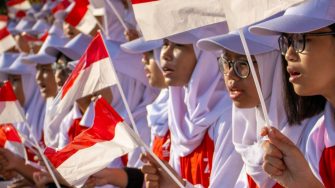
The Australian Human Rights Institute, Diplomacy Training Program and Institute for Global Development launch new short course as part of the Australia Awards in Indonesia program.
In February 2020 on the 70th anniversary of formal diplomatic relations between Australia and Indonesia, President Joko Widodo referred to Australia as Indonesia’s “closest friend” in an address to Australian Parliament in Canberra.
His characterisation of Indonesia-Australian relations reflects the aspirations of both countries moving forward under the Comprehensive Strategic Partnership to further their collective interests in a region that is ever-evolving geopolitically and geoeconomically.
Beyond the agreement, however, the Australian Government has also recognised the value of strengthening relations between Indonesia and Australia’s human rights advocates.
This year the Australian Human Rights Institute, Diplomacy Training Program and Institute for Global Development (UNSW) launched a new short course ‘Human Rights Leadership to Influence Policy’ as part of the Australia Awards in Indonesia program, funded by the Australian Government.
“We are delighted to see this new initiative arise to foster dialogue, collaboration and Australia-Indonesia linkages for human rights, and acknowledge the leadership of the Diplomacy Training Program, the Australian Human Rights Institute and the Australia Awards Indonesia program to make it possible,” said Kirsten Ridley, the collaboration lead at the Institute for Global Development.
The course builds on the long histories of the Diplomacy Training Program and the Australian Human Rights Institute’s engagement with human rights movements and institutions in Indonesia, Australia and globally.
The first-of-its-kind course aims to assist 25 experienced Indonesian human rights advocates – from national Human Rights Commissions to NGOs – in their work to promote and defend human rights in Indonesia.
It will facilitate the exchange of experience and expertise between human rights leaders and organisations in Australia and Indonesia. Through building Indonesian-Australian relationships and collaborations on human rights, it is hoped that the course will strengthen the ability of individuals and organisations to effectively influence policy and practice.
“Our countries are very different, but we share some challenges in human rights including recognition of the rights of Indigenous peoples, discrimination towards persons with disabilities, violence against women, and working with faith communities to uphold the rights of all,” said Patrick Earle, executive director of the Diplomacy Training Program.
The inaugural session of the program was delivered on Monday, 22 September, with an inspiring opening keynote address by the Hon. Michael Kirby AC CMG. The former Australian High Court Justice reflected upon the gradual nature of human rights change, recognising that human rights advocacy was often limited by societal and historical contexts.
He shared his belief that even where such challenges exist, advocates could still have courage, work strategically, and endeavour to find spaces and allies to advance human rights.
Over the next seven weeks, numerous distinguished Australian human rights experts engaged with the participants on diverse human rights themes including Business and Human Rights (Justine Nolan), Refugee Rights (Graham Thom), Indigenous Rights (Dani Larkin and Teina Te Hemara), Child Rights (Noam Peleg), Gender and Women’s Rights (Andrew Byrnes), Disability Rights (Rosemary Kayess and Therese Sands), and Minority Rights (Vitit Mutharbhorn and Chris Sidoti).
Experts also sought to collaborate with the participants on developing advocacy strategies by building coalitions, undertaking project refining exercising, and utilising different human rights mechanisms.
“This collaborative course is all about learning from each other and our shared experiences to advance human rights in our region,” said Professor Justine Nolan, director of the Australian Human Rights Institute.
The participants have just moved into the second phase of the program, which will see them continue to develop human rights projects aimed at addressing issues of gender, sexual orientation, disability, child, Indigenous, minority, and migrant rights in Indonesia. As well as historical human rights violations.
The Indonesian participants are both looking forward to continuing their work together as well as with the new connections they have made with Australian experts, advocates and advocacy organisations. It is their hope that this will be the beginning of greater collaboration between Indonesian and Australian advocates on human rights challenges, and bilateral relations which will continue over the next 70 years and beyond.
